








Postal address
PO Wits, 2050, South Africa
Physical address
Fifth Floor, Es'kia Mphahlele Building, Jorissen Street, Braamfontein, Johannesburg, South Africa
Telephone
+27 11 717 8700
www.witspress.co.za
Publisher Veronica Klipp | Veronica.Klipp@wits.ac.za
Digital Publisher
Andrew Joseph | Andrew.Joseph@wits.ac.za
Commissioning Editor Louis Gaigher | Louis.Gaigher@wits.ac.za
Marketing Coordinator Corina van der Spoel | Corina.VanDerSpoel@wits.ac.za
Production Editor Kirsten Perkins | Kirsten.Perkins@wits.ac.za
Administrator Refiloe Mashigo | Refiloe.Mashigo@wits.ac.za
Bookkeeper
Andrew Shikwambana | Andrew.Shikwambana@wits.ac.za
Wits University Press is a member of the Publishers’ Association of South Africa and of the Association of University Presses (AUP).
Deborah Posel

Deborah Posel is a sociologist and Professor Emeritus at the University of Cape Town. She is the founding director of UCT’s Institute for Humanities in Africa and the Wits Institute for Social and Economic Research, University of the Witwatersrand, Johannesburg.
A personal journey through forgotten history, Darker Shade of Pale uncovers the hidden story of global migration at the turn of the twentieth century from the Jewish territories of the Russian Empire, known as the Pale of Settlement, to the distant British colony of South Africa. Following the life of the author’s grandfather – an ordinary man whose struggles reflect those of countless others—this book challenges the familiar narrative of Jewish immigrant success in South Africa. This intimate account opens up a more complex reality. It shows how Jewish concerns with status and success travelled from shtetl to colony, and the psychological costs that came with them; the ironies of this journey for literate, working women from the shtetl; the version of whiteness South Africa assigned to Jews from Eastern Europe, and how they interacted with Black people; some of the unexpected economic paths they followed, and the prejudices they faced – from both the British and the already-assimilated English-speaking Jewish community. Darker Shade of Pale brings the inner dramas of immigration into focus – dislocation, ambition and disappointment –revealing what was gained and what was lost in the pursuit of a new life.
Part memoir, part global history, part historical sociology, part meditation on the ways in which inherited trauma shapes individual lives, Darker Shade of Pale is a poignant story about the life of Deborah Posel’s paternal grandfather. — Jacob Dlamini, Associate Professor, Department of History, Princeton University

Related title: How I Lost My Mother 978-1-77614-694-9
November 2025 | 203 x 127 mm | 288 pp | Paperback | Rights: World Print: 978-1-77614-971-1 | PDF: 978-1-77614-973-5
EPUB: 978-1-77614-974-2
Subjects: Migration, Immigration & emigration, History
Hlonipha Mokoena
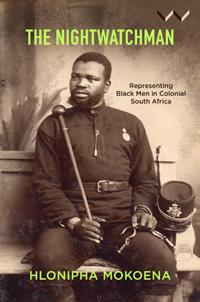
Hlonipha Mokoena is Associate Professor of History and Director of the Wits Institute for Social and Economic Research, University of the Witwatersrand, Johannesburg. She is the author of Magema Fuze: The Making of a Kholwa Intellectual
This illustrated collection of essays brings into focus African men in colonial uniforms as a subject of portraiture. It extends the literature on colonial ethnographic photography by building a narrative of nightwatchman portraiture from a rich archive of images. While a genre of photography developed around images of the ‘Zulu warrior’ after the English defeat at Isandlwana, Hlonipha Mokoena argues that the spectacle of the Zulu male was inaugurated after the last Zulu king was photographed as a posing subject. Much research has focused on the African man as a functionary of settler power; these essays shift debates about how the body is seen and moves in history. Placed in uniform, the male subject becomes aestheticised and admired. Mokoena explores the sartorial choices and the colonial aesthetic culture that shaped the figure of the Nonqgqayi, or nightwatchman, as a fully formed photographic presence. The beauty captured in these portraits challenges the idea of colonial photography as a tool of oppression. Focusing on the black and brown fighting man, The Nightwatchman offers an innovative perspective on portraiture in colonial South Africa and new insights into visual representations of the black male figure.
The Nightwatchman is in a class of its own. At the centre of Hlonipha Mokoena’s original book are aesthetically attired shapeshifters whose agency, prowess and beauty Africanised colonial culture. This is a provocative and powerful story. — Benedict Carton, George Mason University, USA

Related title: Dress as Social Relations 978-1-77614-191-3
August 2025 | 229 x 152 mm | 256 pp | Paperback | Rights: World Print: 9978-1-77614-935-3 | PDF: 978-1-77614-937-7
EPUB: 978-1-77614-938-4
Subjects: Material culture, Colonialism & imperialism
Idi Amin, Yoweri Museveni, and the Making of the Ugandan State Mahmood Mamdani
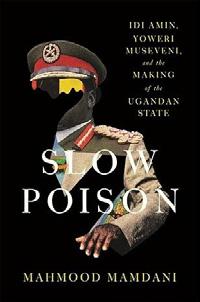
Mahmood Mamdani is Herbert Lehman Professor of Government and Professor of Anthropology and Middle Eastern, South Asian, and African Studies at Columbia University. He was Director of the Makerere Institute of Social Research in Uganda from 2010 to 2022.
In 1972, when Mahmood Mamdani came home to Uganda, he found a country transformed by ‘an orgy of violence’ under Idi Amin. Amin was followed by Yoweri Museveni, who has ruled for nearly four decades. Slow Poison is Mamdani’s firsthand account of the tragic unraveling of his country’s struggle for decolonialization. A witness to East Africa’s intricate power plays and one of the most insightful political philosophers of his generation, Mamdani casts a learned and wary eye on Amin, internationally depicted as a buffoon, the radical scholar Museveni, and the global heavyweights that exploited and manipulated Uganda before and after its independence. Each leader made violence central to his project, but Mamdani sees a signal difference between Amin, who retained popular support to the end, and Museveni, who has not. The Asian expulsion made Amin a monster in the eyes of the West. In contrast, Museveni was hailed as standard bearer of the ‘war on terror’ in Africa, and was protected from accountability for far greater crimes in exchange for adopting neoliberal reforms. While Amin aimed to create a nation of Black millionaires, Uganda’s surrender to privatization has brought Museveni’s family immense wealth, even as the country remains one of the world’s poorest.
Mahmood Mamdani is one of the most acute and resourceful observers of our world, but Slow Poison is exceptionally lavish in its offer of bracing insight and eye-opening exposition. Rarely has any one book captured the profound ambiguity of decolonization: the scrambled pursuit of national freedom, the tortuous negotiations and compromises behind declarations of sovereignty, and the sheer slipperiness of postcolonial power. – Pankaj Mishra, author of The World After Gaza

Related title: Thinking Freedom in Africa
978-1-86814-866-0
October 2025 | 234 x 156 mm | 352 pp | Paperback | Rights: Southern Africa
Print: 978-1-77614-983-4
Subjects: Political Science, History
William Keniston

This is the first book-length account of the assassination of Jeanette and Katryn Schoon on 28 June 1984, ordered by Craig Williamson, a member of the security service and apartheid spy. Jeanette Curtis Schoon and Craig Williamson first met in 1973 at Wits University. Schoon was part of a network of white activists fighting apartheid; Williamson had successfully infiltrated the student movement and rose within its ranks. He held positions of trust, first within the National Union of South African Students and later, after pretending to ‘flee’ the country, as an office-bearer of the International Universities Exchange Fund in Sweden, which helped fund many South African activists in exile. The book uncovers how the lives of a group of white activists intersected with and were impacted by the undercover security police and their operations both within and outside of South Africa in a multitude of ways. Williamson received amnesty for his role in the Schoons’ murder, among other crimes. This book shows the limitations of the Truth and Reconciliation Commission process to deliver social justice and render healing from South Africa’s apartheid past. That justice has not been served to the Schoons remains a tragedy in this story of struggle against apartheid.
Those seeking an honest reckoning with the history and legacy of South Africa’s underground ‘white left’ during the apartheid years need look no farther than Keniston’s gripping Apartheid Spies and the Revolutionary Underground. The intertwined lives of political prisoner Marius Schoon, assassination victim Jeanette Curtis, and apartheid spy Craig Williamson make for a tragic yet inspiring tale of resistance and betrayal--and its price. — Alex Lichtenstein, Professor of History, Indiana University

Related title: One Hundred Years of the ANC 978-1-86814-573-7
June 2021 | 234 x 156 mm | 368 pp | Paperback | Rights: World Print: 978-1-77614-901-8 | PDF: 978-1-77614-903-2
EPUB: 978-1-77614-904-9
Subjects: African history, Terrorism, Armed struggle
Writings, Testimonies and Correspondence from the Life of Robert Mangaliso Sobukwe
Robert Mangaliso Sobukwe, compiled and edited by Derek Hook & Leswin Laubscher

Robert Sobukwe founded the Pan Africanist Congress of Azania in 1959 and was its first president. Derek Hook is Professor of Psychology and a clinical supervisor at Duquesne University, Pittsburgh and Extraordinary Professor of Psychology at the University of Pretoria. Leswin Laubscher is Associate Professor in the Clinical Psychology department at Duquesne University, and he is Extraordinary Professor at the University of the Western Cape.
Darkest Before Dawn captures the story of the years Robert Sobukwe, founder of the Pan Africanist Congress of Azania, spent in Kimberley after his release from Robben Island. It includes political writings, speeches, unpublished court testimonies, and interviews from this period. The biographical narrative by the editors, along with images from Sobukwe’s life, highlights the many challenges he faced. His unwavering political resolve to fight apartheid is reflected in his letters to friends and admirers, including the novelist Bessie Head—whose letters to Sobukwe are published here for the first time. Despite banning orders, Sobukwe continued to meet political allies like Steve Biko, pursue a legal career, and host international visitors. The portrait that emerges is of a deeply ethical man—dignified, wise, and principled—whose commitment to Pan-Africanism remained undeterred, even under near-impossible conditions during his final years. To honour Sobukwe’s intellectual legacy and his enduring dedication to African liberation, Darkest Before Dawn includes detailed annotations by the compilers and closes with a reflective essay that affirms the ongoing relevance of his life, thinking and political vision.
This volume is a significant step towards giving voice and recognition to Robert Mangaliso Sobukwe’s towering contribution to this country’s public life, history and memory. Darkest before Dawn is a tremendous contribution to our history, politics and public memory. — Bongani Ngqulunga, Professor, Department of Politics, University of Johannesburg

Related title: Lie On Your Wounds 978-1-77614-240-8
October 2024 | 234 x 156 mm | 456 pp | Paperback | Rights: World Print: 978-1-77614-856-1 | PDF: 978-1-77614-858-5
EPUB: 978-1-77614-859-2
Subjects: Political activism, Reportage & collected journalism
Barry Schoub

Barry Schoub is the founding Executive Director of the National Institute for Communicable Diseases (NICD) in South Africa. He is Emeritus Professor of Virology at the University of the Witwatersrand, Johannesburg.
Fighting an Invisible Enemy narrates the development of the internationally renowned National Institute for Communicable Diseases (NICD) in South Africa from its foundations in the early twentieth century as the South African Institute for Medical Research and, later, the National Institute for Virology. It started humbly and faced daunting obstacles: financial restrictions, international isolation during the apartheid era and political interference both during and after apartheid. The institute plays a crucial role in the ongoing global effort to eradicate polio, and its HIV research unit has become a world leader. Its multidisciplinary laboratories and epidemiologists support the constant surveillance of communicable diseases and provide alerts for any signal of an impending outbreak or pandemic. The NICD is a flagship public health organisation in South Africa, and this book, enhanced by images of its projects and facilities, paints a vivid portrait of its accomplishments. It will be of interest to public health specialists and activists, as well as a more general audience.
Fighting an Invisible Enemy is a wonderful narrative outlining the history of South African infectious disease research including pneumonia, polio, haemorrhagic fevers and Covid-19. It describes how the NICD has emerged as an African and world leader in communicable disease research – a great read. — Helen Rees, Executive Director, Wits Reproductive Health and HIV Institute, University of the Witwatersrand, Johannesburg

Related title: Baragwanath Hospital, Soweto 978-1-86814-747-2
July 2024 | 229 x 152 mm | 202 pp | Paperback | Rights: World Print: 978-1-77614-897-4 | PDF: 978-1-77614-899-8
EPUB: 978-1-77614-900-1
Subjects: Infectious & contagious diseases
Desert Dystopias and the Environmental
Meredith McKittrick

Meredith McKittrick is Associate Professor of History at Georgetown University, Washington. She is the author of To Dwell Secure: Generation, Christianity, and Colonialism in Ovamboland.
Green Lands for White Men explores how white agriculturalists in southern Africa grappled with a parched and changing terrain as they sought to consolidate control over a Black population. Meredith McKittrick’s timely history of the 1918 Kalahari Thirstland Redemption Scheme reveals the environment to have been central to South African understandings of race. While geologist Ernest Schwarz’s plan to divert two rivers to the Kalahari’s basins was never implemented, it enjoyed sufficient support from white farmers to prompt government research into its feasibility, and years of debate. McKittrick shows how white farmers rallied around a plan that represented their interests over those of the South African state and delves into the reasons behind this schism between expert opinion and public perception. This backlash against the predominant scientific view, McKittrick argues, displayed the depth of popular mistrust in an expanding scientific elite. A detailed look at the intersections of settler society, climate change, white nationalism, and expert credibility, Green Lands for White Men examines the reverberations of a scheme that ultimately failed but influenced ideas about race and the environment in South Africa for decades to come.
An apocalyptic fear haunted whites in Africa: that nature itself was against them. This book dissects how these fantasies and fears coalesced in a story about sustaining a drying land and a dying dream. Bold, rigorous, and original, McKittrick offers us a history as stark and tough as the Kalahari Desert. — Sandra Swart, author of The Lion’s Historian: Africa’s Animal Past

Related title: Hidden Histories of Gordonia 978-1-86814-954-4
October 2024 | 229 x 152 mm | 328 pp | Paperback | Rights: Africa Print: 978-1-77614-951-3 | PDF: 978-1-77614-952-0
Subjects: African history, Social impact of environmental issues
Achille Mbembe, translated by Steven Corcoran
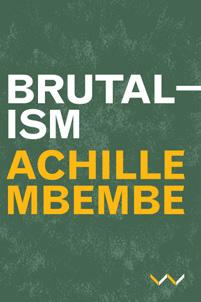
Achille Mbembe is Research Professor in History and Politics at the Wits Institute for Social and Economic Research and at the Innovation Foundation for Democracy, University of the Witwatersrand, Johannesburg. He is author of Necropolitics (2011) and Critique of Black Reason. Steven Corcoran is the translator of a wide-ranging body of French philosophical and literary works.
Eminent social and critical theorist Achille Mbembe invokes the architectural aesthetic of brutalism in his latest book to describe society’s current moment, caught up in the pathos of demolition and production on a planetary scale. Just as brutalist architecture creates an affect of overwhelming weight and destruction, Mbembe contends that contemporary capitalism crushes and dominates all spheres of existence. In our digital, technologically focused era, capitalism has produced a becoming-artificial of humanity and the becoming-human of machines. This blurring of the natural and artificial presents a planetary existential threat in which contemporary society’s goal is to precipitate the mutation of the human species into a condition that is at once plastic and synthetic. Mbembe argues that Afro-diasporic thought presents the only solution for breaking the totalizing logic of contemporary capitalism: repairing that which is broken, developing a new planetary consciousness, and reforming a community of humans in solidarity with all living things.
In an argument both elegant and urgent, Achille Mbembe focuses our attention on the African continent, which is not only where the forms of domination and deprivation that increasingly affect the entire globe are most fully deployed but also where the forms of reparation necessary for a future world can be glimpsed. — Michael Hardt, author of The Subversive Seventies

Related title: Critique of Black Reason 978-1-77614-050-3
March 2024 | 229 x 152 mm | 200 pp | Paperback | Rights: Southern Africa
Print: 978-1-77614-923-0
Subjects: Politics & political theory, History
Nigel C Gibson

Nigel C Gibson is Professor of African Studies at Emerson College, Boston and is the author of many titles based on Fanon's thoughts.
Revolutionary humanist and radical psychiatrist Frantz Fanon was one of the greatest Black thinkers of the twentieth century. Born in Martinique and known for his involvement in the Algerian liberation movement, his seminal books Black Skin, White Masks and The Wretched of the Earth are widely regarded as cornerstones of anti-colonial and anti-racist thought. In this essential introduction to Fanon’s life and philosophy, Nigel C. Gibson argues that Fanon’s work remains vital for understanding race and resistance today. Linking Fanon’s writing, psychiatric practice, and lived experience in the Caribbean, France and Africa, Gibson highlights his philosophical commitments and the transformative vision of revolution he stood for. Despite his early death, the revolutionary pulse of Fanon’s ideas continues to resonate through successive generations—from the Black Panthers and Black Power, to Black Lives Matter and Fallist student movements, as well as grassroots efforts by Black and Indigenous communities resisting the ongoing impacts of capitalism, imperialism and colonialism. As Fanon’s thought inspires new generations striving to 'humanise the world', Gibson reminds us that Fanon’s revolutionary humanism remains central to all global anti-colonial and anti-racist struggles.
Nigel C. Gibson magisterially fills in discursive and biographical details which solidify Fanon as the figure of the present. With combat breathing as the arc, the book engages in respiratory politics which exposes the scandal of the colonial chokehold. Fanon’s truth is what Gibson breathes in these pages. — Tendayi Sithole, author of Black X: Liberatory Thought in Azania

Related title: Being Black in the World 978-1-77614-368-9
September 2024 | 210 x 140 mm | 368 pp | Paperback | Rights: South Africa
Print: 978-1-77614-934-6
Subjects: Social & political philosophy
Edited by Michael Onyebuchi Eze, Lawrence Hamilton, Laurence Piper & Gideon van Riet

Michael Onyebuchi Eze is an associate to the SA-UK Bilateral Research Chair in Political Theory, University of the Witwatersrand, Johannesburg and the University of Cambridge.
Lawrence Hamilton is Professor of Political Studies and the SA-UK Bilateral Research Chair in Political Theory at the University of the Witwatersrand, Johannesburg and the University of Cambridge. Laurence Piper is Professor of Political Science at the University of the Western Cape, and University West. Gideon van Riet is Associate Professor in Political Studies at North-West University.

Rick Turner was a South African academic and activist who rebelled against apartheid at the height of its power and was assassinated in 1978 when he was 32 years old, but his life and work are testimony to the power of philosophical thinking for humans everywhere. Turner chose to live freely in an unfree time and argued for a non-racial, socialist future in a context where this seemed unimaginable. This book considers Rick Turner’s challenge that political theorising requires thinking in a utopian way. Turner’s seminal book The Eye of the Needle: Towards a Participatory Democracy in South Africa laid out potent ideas on a radically different political and economic system. His demand was that we work to escape the limiting ideas of the present, carefully design a just future based on shared human values, and act to make it a reality, both politically and in our daily lives. The contributors to this volume engage critically with Turner’s work on race relations, his relationship with Steve Biko, his views on religion, education and gender oppression, his model of participatory democracy, and his critique of poverty and economic inequality. It’s an important contribution to contemporary thinking and activism.
Related title: The Unresolved National Question in South Africa 978-1-77614-022-0
July 2024 | 229 x 152 mm | 296 pp | Paperback | Rights: World Print: 978-1-77614-893-6 | PDF: 978-1-77614-895-0
EPUB: 978-1-77614-896-7
Subjects: Social & political philosophy, Political science & theory
Edited by Vishwas Satgar & Michelle Williams
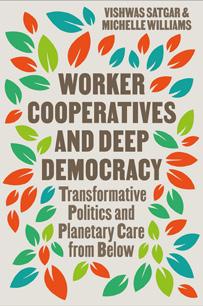
Vishwas Satgar is an associate professor of International Relations at the University of the Witwatersrand, Johannesburg. He is the editor of the Democratic Marxism series, principal investigator for the Emancipatory Futures Studies in the Anthropocene project and a democratic eco-socialist. Michelle Williams is Professor of Sociology at the University of the Witwatersrand, Johannesburg. Her research focuses on democracy, transformative projects, alternative development, and women's participation in political and economic spaces.
Capitalism’s crisis is planetary. It is a system upending nature and society, causing many to live and work in despair. So far, the left has been incapable of inspiring a practical challenge to it. In Worker Cooperatives and Deep Democracy, Vishwas Satgar and Michelle Williams map a new transformative politics arising from inspiring worker cooperative systems that advance planetary care from below and that have the potential to undermine the capitalist status quo. Based on over a decade of research across 15 countries, the authors examine case studies that explore transformative approaches to social reproduction, public power, nature, and territorial expansion in opposition to global hegemonic power. They also uncover the power of solidarities engendering emancipatory, utopian imaginaries in the global north and south. They show how, against all the odds, people are experimenting with deep democracy and building systems of care to live differently and exit the planetary crisis.

Related title: Capitalism’s Crises 978-1-86814-920-9
December 2025 | 216 x 140 mm | 272 pp | Paperback | Rights: SADC + Kenya Print: 978-1-77614-984-1
Subjects: Sociology: work and labour, Political structures: democracy
Dineo Skosana

Dineo Skosana is a senior researcher at Society, Work and Politics Institute (SWOP) at the University of Witwatersrand, Johannesburg.
No Last Place to Rest: Coal Mining and Dispossession in South Africa is an exploration of the ongoing struggles faced by families in the Mpumalanga and KwaZulu-Natal provinces of South Africa whose lives have been upended by the relentless expansion of coal mining operations. These regions, burdened with the task of fulfilling the nation’s energy needs and boosting the country’s economy, witness daily the harsh realities of dispossession that extend far beyond the mere loss of property. Dineo Skosana presents a compelling argument that dispossession remains a presentday reality and crisis. She challenges the narrow perspective that equates land loss in material and economic terms only. Skosana considers the impact of grave relocations—a common occurrence in these mining-dominated locales— and the profound spiritual anguish and dehumanisation communities endure as their lands are excavated. This book offers a rich ethnographic account of the experiences, struggles and resistance of the affected communities as well as a critical analysis of the legal and policy frameworks that enable their exploitation. In relation to the ‘land question’ in South Africa, No Last Place to Rest presents deep insights for communities, activists and government sectors acting in support of social justice and redress.
This must-read book is a stark reminder of the violence of extractive industries on marginalised people. Well researched and beautifully written, the book presents a nuanced understanding of meanings of land, as well as of ‘dispossession as continuous lived experience for black communities in South Africa’. — Thembela Kepe, Professor of Geography, University of Toronto

Related title: These Potatoes Look like Humans 978-1-77614-840-0
March 2025 | 229 x 152 mm | 224 pp | Paperback | Rights: World Print: 978-1-77614-929-2 | PDF: 978-1-77614-931-5
EPUB: 978-1-77614-932-2
Subjects: Social & cultural anthropology, Ethnography, African history
Edited by Vishwas Satgar

Vishwas Satgar is an associate professor of International Relations at the University of the Witwatersrand, Johannesburg. He is the editor of the Democratic Marxism series, and is the principal investigator for the Emancipatory Futures Studies in the Anthropocene project and a democratic eco-socialist.
The Fourth Industrial Revolution (4IR) has been vaunted as the next big leap in digital capitalism. Technologies such as artificial intelligence, quantum computing, 3D printing and robotisation mark this shift that promises not only more progress, growth and development but also solutions to the multiple crises the world is in. However, the billions being invested in these technologies are accompanied by sharp geopolitical rivalries to secure an edge in the control over them. Volume 8 in the Democratic Marxism series, Digital Capitalism and its Limits, questions the dangerous technotopian imaginary shaping this digital-techno shift to examine the risks and power dynamics involved. Contributors delve into the implications of algorithmic data extractivism, the securitisation of already weak market democracies, the social consequences of digital learning, regulatory lags and power dynamics in the labour process, as well as the possible emancipatory futures of such technologies. Anchored in techno-realism, this volume invites us all, from an interdisciplinary perspective, to think more deeply and critically about digital capitalism. We need to reject aspects of it in the public interest, and we may need to democratise it and subject it to a just transition to protect human and non-human life.
New digital technologies, rather than fulfilling their emancipatory potential, are increasing inequality, entrenching power in elite hands and bringing significant risks and iniquitous outcomes. This volume makes the compelling argument that, to be emancipatory, our digital technology choices must be located within the framework of a just transition. — Imraan Valodia, Director of the Southern Centre for Inequality Studies and Pro Vice Chancellor: Climate, Sustainability and Inequality, University of the Witwatersrand, Johannesburg

Related title: Recasting Workers’ Power 978-1-77614-882-0
May 2025 | 234 x 156 mm | 208 pp | Paperback | Rights: World Print: 978-1-77614-940-7 | PDF: 978-1-77614-942-1
EPUB: 978-1-77614-943-8 | OA PDF: 978-1-77614-944-5
Subjects: Ethical & social aspects of IT, Sociology: work & labour
Hannah J Dawson
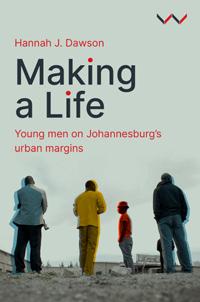
Hannah J Dawson is a senior lecturer in the Anthropology and Development Studies department at the University of Johannesburg. Her research addresses the social, economic, and political changes resulting from mass unemployment and examines how the future of work and welfare is being imagined and transformed in Southern Africa.
Making a Life: Young Men on Johannesburg’s Urban Margins explores the dynamic everyday life-making strategies of young men in Zandspruit, a sprawling informal settlement on the outskirts of Johannesburg. In many ways Zandspruit typifies the precariousness of life within South Africa, where two-thirds of young people lack waged employment. However, rather than seeing Zandspruit as dumping ground, Hannah J. Dawson calls for an integrated understanding of the complex linkages between people’s lives and livelihoods, and the multifaceted sociopolitical landscape of urban settlements. Based on 14 months of ethnographic research, Dawson investigates how social belonging, identity and economic realities intertwine in places such as Zandspruit. This approach not only challenges conventional approaches to studying work, it also questions the increasingly prevalent perspective that romanticises the adaptive survival strategies of the urban poor. By exploring the intricate connections between those with and without wages, the author shows how young men manage complex social, political and economic conditions. Making a Life offers insights into issues such as urban work, citizenship, un(der) employment and inequality in South Africa. At the same time, it contributes to a global understanding of how young people – men especially – manage economic uncertainty.
Among the young men Dawson meets, many consider employment in the formal sector a defeat best avoided. She thus writes of ‘the productivity of unemployment’ because remaining outside of the formal economy involves ceaselessly inventive, creative work. Dawson’s deep dive into moral lives on the urban margins is accomplished and rewarding and very often tugs against our intuitions. — Jonny Steinberg, Yale University

Related title: Becoming Men 978-1-77614-567-6
May 2025 | 208 x 152 mm | 234 pp | Paperback | Rights: World Print: 978-1-77614-953-7 | PDF: 978-1-77614-955-1
EPUB: 978-1-77614-956-8
Subjects: Social & cultural anthropology, ethnography, Cultural studies
Deborah James

Anthropology
the London School of Economics and Faculty Associate in the International Inequalities Institute. She is the author of Money from Nothing (2014).
The impulse to redistribute wealth is said to be a tool to counter inequalities, applied by the state or society to curb the worst excesses of capitalist exploitation and free trade. In settings where previous political regimes are reformed, or toppled and replaced by new ones, redistribution can also be a policy specifically oriented at redress, one exercised at the formal level of policy. Drawing on a comparative ethnography in South Africa and the United Kingdom, Clawing Back explores how notions of reallocation and payout are intimately connected with those of compensation for a loss. Where financialisaton is accompanied by increased informalisation, redistribution can equally involve the market as well as kinship and social networks. Drawing on a rich ethnography of the human relationships at the centre of redistribution, Deborah James shows how borrowing can provide negotiation opportunities to wage earners and welfare beneficiaries alike: they make use of debt to constitute relations and futures, to engage with the state and to convert between commodified and non-commodified relationships. Rather than suggesting that financialisaton is serving either a totally negative or wholly beneficial purpose, James posits a different way of visualizing the relationship between the finance industry and the world of everyday needs.
James deftly challenges totalizing accounts of financialization and evocatively illuminates how financial and familial relationships interlock, people tack back and forth between calculative and relational forms of reason, and borrowing can be seen not as a beggar’s supplication but a strategist’s gambit, which while not always unequivocally successful nevertheless affirms agency in a world where we so frequently feel we have been stripped of it. — Bill Maurer, University of California, Irvine.

Related title: In the Balance 978-1-77614-772-4
July 2025 | 229 x 152 mm | 204 pp | Paperback | Rights: SADC Print: 978-1-77614-969-8 | PDF: 978-1-77614-970-4
Subjects: Political economy, Labour & industrial relations
Edward Webster, foreword by Michael Burawoy

Edward Webster was a Research Professor in the Southern Centre for Inequality and founder of the Society, Work and Development Institute Studies at the University of the Witwatersrand, Johannesburg. Michael Burawoy was a distinguished Professor of Sociology at the University of California, Berkeley and former President of the International Sociological Association.
First published by Ravan Press in 1985, Cast in a Racial Mould was a pioneering book. It is now republished by Wits University Press with a new foreword by Michael Burawoy and with support from the National Institute for the Humanities and Social Sciences. This seminal work explores the complex dynamics of labour relations and worker resistance in South Africa’s metal industry, a crucial part of the country’s manufacturing base. Drawing on extensive research, the book challenges Harry Braverman’s view of mass production as a relentless force of worker control. Instead, it uncovers two key forms of resistance: white craft workers’ efforts to resist deskilling, and black workers’ emerging collective bargaining power. Eddie Webster shows how white moulders used racial hierarchies to retain craft privileges, becoming supervisors of semi-skilled black labour. But this structure came under pressure with the rise of independent black unions and more assertive black workers. The study examines how post-1976 township struggles led to state reforms through the Wiehahn and Riekert commissions. Cast in a Racial Mould offers a powerful critique of racial capitalism and traces the evolution of working-class consciousness amid attempts at state incorporation.
Reading Cast in a Racial Mould today demonstrates its relevance not only to the study of labour process and labour movements, but also to the notion of ‘racial capitalism’ that has been so widely invoked in recent times. — Michael Burawoy

Related title: Labour Disrupted 978-1-77614-822-6
May 2025 | 216 x 140 mm | 340 pp | Paperback | Rights: World Print: 978-1-77614-961-2 | PDF: 978-1-77614-962-9
EPUB: 978-1-77614-963-6
Subjects: Industrial relations, Health & safety
Casey Golomski

Casey Golomski is an associate professor of anthropology and women and gender studies at University of New Hampshire in Durham. He is the author of Funeral Culture: AIDS, Work, and Cultural Change in an African Kingdom (2018).
God’s Waiting Room: Racial Reckoning at Life’s End is a poignant and immersive exploration of life in a South African nursing home, built atop a graveyard left behind by the forced removals of apartheid. Rich in mystery and life’s lessons, it considers what matters in the end for older white adults and the younger Black nurses who care for them. Casey Golomski’s years of immersive research are narrated as a one-day, room-by-room tour in which the stories of seven individuals highlight the tensions between care and prejudice, survival and memory, as they reckon with the apartheid era’s haunting legacy. Told in breathtakingly intimate and witty conversations with the home’s residents and nurses, including the untold story of Nelson Mandela’s Robben Island prison nurse, readers learn how ageism, sexism, and racism intersect and impact health care as well as create conditions in which people primed to be enemies find grace despite the odds.
A profoundly beautiful exploration of what decline and dilapidation mean for those whose lives were largely lived in compact with racial separation. — Wamuwi Mbao in The Johannesburg Review of Books

Related title: Worrier State 978-1-77614-788-5
December 2024 | 234 x 156 mm | 238 pp | Paperback | Rights: SADC + Kenya Print: 978-1-77614-949-0 | PDF: 978-1-77614-950-6
Subjects: The elderly, Social discrimination & inequality
Srila Roy
Srila Roy is Professor of Sociology at the University of the Witwatersrand, Johannesburg. She is the author of Changing the Subject: Feminist and Queer Politics in Neoliberal India (2022). She leads the Governing Intimacies project that promotes new scholarship on gender and sexuality in southern Africa and India.
In Dissonant Intimacies Srila Roy reflects on the limits and possibilities of a global decolonial feminist agenda in the Global South. Her highly personal essays explore recent interventions into higher education that seek to produce new forms of knowledge and solidarity across gender, race, caste and location/borders. Drawing on her experience as a South Asian scholar in South Africa, Roy has found the practice of transnational feminism difficult, even fraught, when faced with movements such as South Africa’s Fees Must Fall, India’s #MeToo and resistance to the genocide in Palestine. The Global South emerges as a space of dissonance in spite of her pursuit of SouthSouth collaboration and alternative scholarly engagements based on feminist and decolonial pedagogies. In charting these tensions, Roy reminds us that the Global South is not one thing. She raises the stakes for decolonial feminist knowledge production and transnational solidarity while stressing the importance of building new epistemic infrastructures that orient us towards the South.

Related title: Surfacing: On being black and feminist in South Africa 978-1-77614-609-3
May 2026 | 229 x 152 mm | 188 pp | Paperback | Rights: World Print: 978-1-77614-990-2 | PDF: 978-1-77614-992-6
EPUB: 978-1-77614-993-3
Subjects: Feminism & feminist theory, Decolonisation of knowledge
Notes and Sources for Student Librarians, Printers, Booksellers, Stationers, Book-collectors Percy Freer, introduction by Veronica Klipp

Percy Freer was the first librarian of the Wits Library, University of the Witwatersrand, in 1929. Veronica Klipp is Publisher at Wits University Press.
Bibliography and Modern Book Production is a fascinating historic journey through the fields of print history, librarianship and publishing. It covers key developments from 1494 to 1949 in bibliography and book production from the history of scripts and paper manufacture to the origins of typefaces and printing. Although not a textbook, the book was a guide for library students in the 1950s on the essential literature of librarianship. As the first librarian appointed to Wits University in 1929, Percy Freer’s near encyclopaedic knowledge of the subject of bibliography enabled him to develop a key resource for relevant library examinations in South Africa and abroad. Due to its immense value as a historic record, and to acknowledge Freer’s contributions as scholar, librarian and publisher, it is being reissued as part of the Wits University Press Re/Presents series to make it accessible to scholars in book histories, publishing studies and information science.

Related title: Print, Text and Book Cultures in South Africa 978-1-86814-566-9
August 2024 | 229 x 152 mm | 376 pp | Paperback | Rights: World Print: 978-1-77614-909-4 | PDF: 978-1-77614-911-7
EPUB: 978-1-77614-912-4
Subjects: Bibliography, Publishing industry & book trade
Edited by Sarah Nuttall & Isabel Hofmeyr

Sarah Nuttall is Professor of Literary and Cultural Studies at the Wits Institute for Social and Economic Research (WISER) at the University of the Witwatersrand, Johannesburg. Isabel Hofmeyr is Professor Emeritus of African Literature at the University of the Witwatersrand, Johannesburg.
In 2022 Wits University Press marked its centenary, making it the oldest university press in sub-Saharan Africa. While in part modelled on scholarly publishers from the global North, it has had to contend with the constraints of working under global South conditions: marginalisation within the university, budgetary limitations, small local markets, unequal access to international distribution and sales channels, and the privileging of English-language publishing over indigenous languages. This volume showcases the history and achievements of the Press: from documenting its evolution through book covers and giving credence to some of the leading black intellectuals and writers of the early 20th century and the success of their works in spite of their authors’ racial marginalisation, to the role of women both in publishing and in the spaces afforded to women’s writing on the Press’s list. The collection concludes with author essays on the politics and experiences of choosing and working with a global South publisher. The collection shows the strategies deployed by the Press to professionalise Southern knowledge making and how local university presses support the scholarly mission of their universities for local and global audiences.
This collection of essays brings together the craft, the art, the techniques, the commerce, the passion and, quite simply, the love of books and the histories of their making. Not only are these essays – which range from book design to black writing, women’s writing, academic publishing and so much more – a delight to read, they are also evidence – if ever it was needed – that intellectual work of a high calibre has been, and continues to be, alive and well in the global South. — Urvashi Butalia, Zubaan Publishers, India

Related title: Reading from the South 978-1-77614-836-3
November 2024 | 229 x 152 mm | 366 pp | Paperback | Rights: World Print: 978-1-77614-924-7 | PDF: 978-1-77614-926-1
EPUB: 978-1-77614-927-8 | OA PDF: 978-1-77614-928-5
Subjects: Publishing industry & book trade, Cultural studies
Vusumuzi R Kumalo & Benjamin N Lawrance
Vusumuzi R Kumalo is Senior Lecturer in History at Nelson Mandela University. He is the author of From Plough to Entrepreneurship: A History of African Entrepreneurs in Evaton 1905-1960s (2020) and South Africa’s Struggle for Independent Education (2023). Benjamin N Lawrance is Professor of History at the University of Arizona. He is the author of Amistad’s Orphans: An Atlantic Story of Children, Slavery, and Smuggling (2014) amongst others.
Original Apartheid Hustler is the story of the enigmatic Dugmore Boetie (or Buti), a writer best remembered for his posthumously published Familiarity is the Kingdom of the Lost (1969), a lively, semi-autobiographical account of a one-legged confidence trickster’s improvised life in Johannesburg’s Sophiatown during the 1950s. Engaging multiple registers, Original Apartheid Hustler is a biographical study, a literary deconstruction of Boetie’s texts, and a decolonial meditation on racialised exploitation. It follows several threads, including detailed archival and oral-historical work with Boetie’s family, in a quest to understand, among other questions, Boetie’s involvement with a group of white writers who exercised trusteeship over his work. These included luminaries such as Ruth First, Nadine Gordimer, and dramatist Barney Simon. Simon was instrumental in getting Familiarity published but controversially took over the book’s copyright. Drawing on historical and literary analysis, Vusi Kumalo and Benjamin Lawrance unravel the web of fact, fantasy, and myth, exposing the highly racialised socio-cultural, political, legal, and intellectual violence Boetie and his legacy suffered during and after apartheid. They reveal Boetie’s resilient self-fashioning, fabricated identities, and the concealment of his disability and literary contributions. Original Apartheid Hustler makes an important contribution to debates about authorship, privilege, creativity, and race— both during apartheid and into the present.

Related title: Bloke of All Ages 978-1-77614-975-9
May 2026 | 229 x 152 mm | 352 pp | Paperback | Rights: World Print: 978-1-77614-986-5 | PDF: 978-1-77614-988-9
EPUB: 978-1-77614-989-6
Subjects: Biography: writers, Literature: history & critism
Suren Pillay
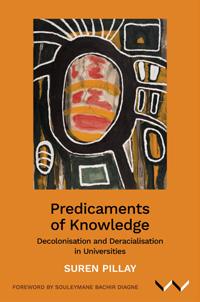
Predicaments of Knowledge explores the difficult questions South African universities face after apartheid: Is there a difference between Africanising a university and decolonising a university? Or between deracialising and decolonising curricula taught at universities across disciplines? Through a range of reflections on race, language, colonial, postcolonial and decolonial knowledge projects this book clarifies the pitfalls and possibilities that face a post-apartheid generation inventing the future of knowledge. Current plans to ‘decolonise’ the university after apartheid often conflate three distinct but equally important imperatives: decolonisation, deracialisation and Africanisation. These distinction between decolonisation and deracialisation is sometimes conflated in the political demands put to universities as well. By parsing out the distinction between decolonisation, deracialisation and Africanisation Suren Pillay emphasises all three as important but distinct imperatives. Drawing on more than two and half decades of the author’s participation in these debates, the essays gathered here are to be read as ‘interventions’ in a larger living debate. They elucidate what our predicaments might be rather than foreclose debate or solutions and are dialogical in spirit even when occasionally polemical in tone.
Timely and expansive ruminations on the purpose of the university and knowledge production in post-apartheid South Africa that help us think through the material construction of universities across the African continent. For those of us invested in making or consuming knowledge, as well as reconstituting the university, it is essential reading. — Victoria J. CollisButhelezi, Director of the Johannesburg Institute of Advanced Studies (JIAS).

Related title: Epistemic Justice and the Postcolonial University 978-1-77614-784-7
September 2024 | 229 x 152 mm | 216 pp | Paperback | Rights: World Print: 978-1-77614-905-6 | PDF: 978-1-77614-907-0
EPUB: 978-1-77614-908-7
Subjects: Higher & further education, Decolonisation of knowledge
Johnny Clegg
Edited by Michael Drewett & Lucilla Spini

Michael Drewett is Professor in the Department of Sociology at Rhodes University. Lucilla Spini is a bioanthropologist and sustainability expert and is Senior Research Fellow at the Italian National Research Council’s Institute for Heritage Science (CNR-ISPC), Rome.
This book examines the legacy of Johnny Clegg (1953–2019), the South African musician, anthropologist and cultural activist who reshaped the nation’s musical and political landscape. From his early collaboration with Sipho Mchunu to his global success with Juluka and Savuka, and as a solo artist, Clegg defied apartheid-era censorship while pioneering new forms of cultural activism. Drawing on archival research and interviews, the authors explore Clegg’s synthesis of music, dance and political philosophy as embodied resistance against apartheid. They analyse his transnational impact, particularly his navigation of the global cultural boycott, and investigate cultural appropriation and decolonial practice through his engagement with Zulu traditions. Situated within ethnomusicology, anthropology and African studies, this book introduces fresh theoretical approaches to cultural hybridity and postcolonial performance. It positions Clegg’s work within broader debates on race, power and cultural production in the Global South, highlighting his role as both scholar and performer. This volume illuminates how Clegg’s career and activism navigated complex culturalpolitical landscapes while shaping academic discourse.
This volume is an eye-opening, wonderfully diverse set of essays on the life and achievements of musician and political arts activist Johnny Clegg. It reaches from his identity struggles as a youngster to his self-created international achievements, fame, and laurels in South African and world music, written by those who knew him best and studied his ascent most intimately. If there is one book that Clegg's admirers and students must have, in addition to his autobiography of his early years, it is this one. — David B. Coplan, author of In Township Tonight! Three Centuries of South African Music and Theatre

Related title: The Times Do Not Permit 978-1-77614-919-3
October 2025 | 234 x 156 mm | 336 pp | Paperback | Rights: World Print: 978-1-77614-964-3 | PDF: 978-1-77614-966-7
EPUB: 978-1-77614-967-4
Subjects: Popular music, Cultural studies
The Musical
Life of
Christine Lucia
Michael Mosoeu Moerane
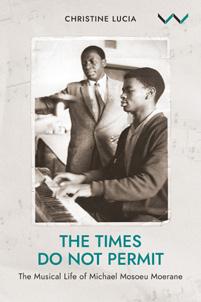
Christine Lucia is Honorary Professor at Africa Open Institute for Music, Research and Innovation at Stellenbosch University and editor of African Composers Edition, an online publication of African compositions.
The Times Do Not Permit is the first extended overview of the life, times, and music of Michael Mosoeu Moerane (19041980), an African composer brought up in rural South Africa in the early twentieth century, one of many mission-trained musicians who wrote short a cappella choral works for churches and schools. It explores the political changes and social conditions that made life for Moerane both possible and impossible as a composer. He was the first black South African to qualify with a BMus degree in 1941. However, this caused difficulties for him both within the African choral circuit, where his advanced modernist style was considered strange and difficult, and within white concert life, from which he was largely excluded. Lucia describes his ancestry, upbringing, education and teaching career, and offers an analysis of his music: his famous symphonic poem, Fatšo La Heso, and four of his choral pieces, grouped to reflect the major themes he expressed. The Times Do Not Permit is supplemented with interviews with those who knew Moerane and ends with a coda of professional letters to, from, and about him that gives his voice a presence in the absence of much personal documentation.
With this richly contextualised account of the musical life of Michael Moerane, a gifted composer of choral music in twentieth-century southern Africa, who happened to be black, Lucia has provided us with a model for telling the stories of many unsung composers of African art music. — Kofi Agawu, Distinguished Professor, The Graduate Center, City University of New York

Related title: Composing Apartheid 978-1-86814-456-3
November 2024 | 234 x 156 mm | 304 pp | Paperback | Rights: World Print: 978-1-77614-919-3 | PDF: 978-1-77614-919-3
EPUB: 978-1-77614-922-3
Subjects: Individual composers & musicians, Biography: arts & entertainment
Public Art and a Transforming City
Edited by Jay Pather

Jay Pather is a choreographer, curator, teacher and writer. He is Professor at the University of Cape Town where he directs the interdisciplinary Institute for Creative Arts (ICA). He is the co-editor of Acts of Transgression (2019).
Restless Infections is an innovative collection of critical essays exploring artistic interventions in urban spaces, focusing on place-making and the politics of space in South Africa. The contributors examine seminal artworks by South African artists, addressing diverse forms of expression, such as site-specific performances, immersive installations, film, photography and online performances. The volume stems from the popular Infecting the City public art festival, symbolising the persistent state of restlessness in a city still grappling with the legacies of colonialism, inequality and racial segregation. This restlessness is tied to a desire for economic and political stability, expressed through transient art forms. It is divided into three sections: The Restless City, Public Art for Multiple Publics, and Land, Home, Belonging. The book shifts the focus of public art discourse in South Africa from static forms such as monuments and statues to dynamic, temporary interventions that question the concept of publicness and engage with protest, public intimacy, audience interaction and the disrupted topography of apartheid cities. As the first scholarly volume to read public spheres through a multi- and interdisciplinary lens, Restless Infections argues that diverse artistic modes are essential to understanding the complexities of publicness in South Africa.
Space and place take on tremendous potency in South Africa, as Restless Infections beautifully conveys. Inserting performing and visual art into the pulse of the city, artists navigate streets and alleys in multiple and unpredictable ways, redeploy plinths and fountains in countercommemorative acts and dive bravely into subterranean zones on the periphery that demand not only to be seen, but also experienced and acknowledged. — Catherine M Cole, Professor of English and Dance, University of Washington

Related title: Acts of Transgression 978-1-77614-279-8
May 2025 | 234 x 156 mm | 284 pp | Paperback | Rights: World Print: 978-1-77614-945-2 | PDF: 978-1-77614-947-6
EPUB: 978-1-77614-948-3
Subjects: Performance art, Public art
Bloke Modisane, edited by Siyabonga Njica & Siphiwo Mahala

William (Bloke) Modisane (28 August 1923 – 1 March 1986) was a South African writer, actor and journalist. Siyabonga Njica is a literary and cultural historian and the Isaac Newton Trust Fellow in Global African History at the University of Cambridge. Siphiwo Mahala is an accomplished short story writer, novelist, playwright and literary critic. He is an associate professor in the English Department at the University of Johannesburg.
Bloke of All Ages is an expansive reflection that offers refreshing new insights into the works of one of South Africa’s most important literary, intellectual and artistic figures, William Bloke Modisane. Born in Sophiatown, Modisane was a remarkable author, playwright and actor, and a leading member of the DRUM generation in the 1950s. The contributors trace Modisane’s intellectual and cultural journey from his early years in South Africa to his exile in the United Kingdom, East Africa, North America, Italy, the German Democratic Republic, and the Federal Republic of Germany. Through a comprehensive and diverse exploration of Modisane’s body of work, they offer critical literary essays on his early short stories, his autobiography Blame Me on History, his journalism as well as his writings while in exile. The volume also includes little-known and previously unpublished essays by Modisane, written during his time in exile. Bloke of All Ages highlights the timelessness and resilience of Modisane’s work and situates Modisane’s significant intellectual and cultural contribution to South African creative arts.

Related title: Keorapetse Kgositsile and the Black Arts Movement 978-1-77614-892-9
February 2026 | 229 x 152 mm | 272 pp | Paperback | Rights: World Print: 978-1-77614-975-9 | PDF: 978-1-77614-977-3
EPUB: 978-1-77614-978-0
Subjects: Literary studies: c 1900 to c 2000, Literary essays
Elleke Boehmer

Elleke Boehmer is Professor of World Literature in English at the University of Oxford. She is an acclaimed novelist and has published widely in the field of Postcolonial Studies. She is Extraordinary Professor in English at the University of Pretoria.
A northern viewpoint is most often the default, while the south—the far southern latitudes occupied by Australia, New Zealand, Argentina and southern Africa, among others—seems far away and ignorable. In Southern Imagining, Elleke Boehmer offers an alternative perspective, using literary, scientific and cultural material to explore how we look at the world from the south. Reading, she argues, is a transformative means of reversing our usual planetary perspective and rearranging our perceptual geography. Boehmer examines writing from across southern continents and islands, considering how we imaginatively inhabit the farthest reaches of our planet. From the Portuguese epic poet Luís de Camöes to Samuel Taylor Coleridge, Charles Darwin, Katherine Mansfield, Jorge Luis Borges and ancient Indigenous scribes, she finds writers that capture the edgy and austere experiences of the far south. Boehmer argues that imaginative work stimulates and shapes our phenomenological understanding. She suggests that the south-tilted world map, re-centred through song and story, invites us to claim a more involved sense of belonging to our planet, both its north and its south. The writers of the south disrupt conventional ways of seeing and invite us to inhabit our globe differently.
The southern oceans have been presented as a space of the limitless beyond, an untamed blank space inscribed on by imperial voyagers and writers in search of vastness. Boehmer brings erudition, passion and poetry to the project of generating a vast archive of filiations between indigenous cosmologies and the literary imagination. This book shows how transhemispheric conversations can move us beyond a northern solipsism to think with the planetary. — Dilip Menon, University of Witwatersrand, Johannesburg.

Related title: Foundational African Writers 978-1-77614-751-9
February 2026 | 234 x 156 mm | 296 pp | Paperback | Rights: South Africa Print: 978-1-77614-985-8
Subjects: Literature: history and criticism, Cultural and media studies
Ecological
Kirk B Sides
Kirk B Sides is Assistant Professor of English and Affiliate Professor of African Cultural Studies at the University of Wisconsin-Madison. He is also a Research Affiliate with the Wits Center for Diversity Studies (WiCDS) at the University of Witswatersrand, Johannesburg.
Environmental Entanglements traces a long history of ecological thought in African literature. Reading African literatures as environmental literatures, Environmental Entanglements offers an interventional step back beyond the mid-twentieth-century moment of political independence. Thinking about 'entanglement' to represent relations ecologically, the book explores a form it defines as an ecological imaginary, animating many African literary and cultural repertoires. This ecological form gives story to experiences of crossing colonial/apartheid boundaries, the movement of peoples, and the cultural and social relations enacted upon land. Focusing on literary and filmic texts, from early writers such as Thomas Mofolo and Sol Plaatje to contemporary science and speculative fiction producers like Nnedi Okorafor and Wanuri Kahiu, Environmental Entanglements argues that cultural archives from the African continent display a history of ecological awareness predating mid-twentieth-century decolonization. The book is premised on the idea that imagining ecologically as a form of representing relations is not a belated preoccupation, but that these imaginaries offer a chance to delink environmentalism, ecology, and ecocriticism from postcoloniality. Reading ecology as an animating, organizing trope in African literatures since the early twentieth century, the book offers a genealogy of the present, where eco-oriented African futurism and speculative fiction continue a longstanding tradition of imagining the future ecologically.

Related title: Natures of Africa 978-1-86814-913-1
January 2026 | 234 x 156 mm | 216 pp | Paperback | Rights: South Africa
Print: 978-1-77614-995-7
Subjects: Literary studies: fiction, novelists & prose writers, Environmentalist thought & ideology
Siphiwo Mahala

Siphiwo Mahala is an award-winning short story writer, novelist, playwright and literary critic. He is a senior lecturer in the Department of English at the University of Johannesburg and a research fellow at the Johannesburg Institute for Advanced Study.
Siphiwo Mahala delves into the lives of iconic figures from South Africa’s tumultuous past in this remarkable collection of plays. The House of Truth is a gripping portrait of the complex journalist and playwright Can Themba. This one-man play weaves together elements of Themba’s life and career, recreating the excitment and pathos of the DRUM era and Sophiatown under apartheid. Themba is brought to life as an ordinary person with human flaws and attributes are tragic and inspirational. In Bloke and His American Bantu, Mahala brings to life the extraordinary friendship between exiled writer Bloke Modisane and American poet Langston Hughes. Through a reimagined correspondence, the two-person play deftly explores how a simple friendship blossomed into a catalyst for international solidarity and cultural exchange between South Africa and Black America. Both plays are set against backdrops of oppression and explore themes of identity, creativity and resilience. Mahala’s masterful storytelling illuminates the human spirit’s enduring power to inspire and uplift, even in the darkest of times.
Dr. Siphiwo Mahala does not simply write the archive; he animates it. This work is an act of poetic remembrance, a homage to history, and a testament to the enduring power of storytelling. His plays, Bloke and His American Bantu and The House of Truth, transcend mere performances to become vibrant acts of preservation, revitalising the memories of South African heroes and the worlds they inhabited. — Dr Refiloe Lepere, drama therapist and playwright

Related title: Can Themba 978-1-77614-731-1
March 2025 | 229 x 152 mm | 112 pp | Paperback | Rights: World Print: 978-1-77614-887-5 | PDF: 978-1-77614-888-2
EPUB: 978-1-77614-889-9
Subjects: Plays, playscripts
Nadia Davids, foreword by Sisonke Msimang

Nadia Davids is a writer, theatre-maker and scholar. Her plays At Her Feet, Cissie (2009) and What Remains (2019) have won various Fleur de Cap Theatre awards. Sisonke Msimang is a fellow at the Wits Institute of Social and Economic Research (WiSER) at the University of the Witwatersrand, Johannesburg.
Rosa and Ben Feigel are a cosmopolitan progressive, dynamic, inter-racial North London couple. Rosa is the daughter of black South African exiles; Ben is of Jewish decent - the son of a man who escaped to the UK on Kindertransport. Their adored teenage son Oliver - full of political conviction, which his parents have encouraged - has hidden his closest friend, Imran, an asylum-seeking teenager from an unnamed country, in their home. When Ben and Rosa find out, they realise they are faced with just two options: turn the child over to the authorities knowing that he will be sent back to a dangerous country or help him to hide and endanger themselves. A bitter argument erupts between the Feigels about the morality of the law, the limits of empathy, what we will do to protect those we love, and what we might sacrifice for strangers. Hold Still is a vivid, deeply affecting portrait of a long-term marriage, and a family shaped by intergenerational trauma.
Past and present intertwine in the London world Nadia Davids crafts in Hold Still. The family drama is deftly reconfigured in a multilayered tale where migration impacts on all the characters in complex and sometimes conflicting ways. The result is a beautiful and beguiling drama where generational conflict exposes the legacy of colonialism and the savagery of war. This is an urgent, contemporary and profoundly human play that resonates across these troubled times. — Professor Maria M. Delgado, The Royal Central School of Speech and Drama, University of London

Related title: What Remains 978-1-77614-277-4
January 2025 | 190 x 120 mm | 82 pp | Paperback | Rights: South Africa Print: 978-1-77614-884-4 | PDF: 978-1-77614-885-1
EPUB: 978-1-77614-886-8
Subjects: Plays, playscripts
Neil Coppen & Mpume Mthombeni

Neil Coppen is a playwright and theatremaker from KwaZulu-Natal. He is a cofounder of Empatheatre and was awarded the 2019 Olive Schreiner Prize for Drama for Tin Bucket Drum. Mpume Mthombeni is an award-winning stage and film actor from Umlazi, Durban. She has performed multiple roles in theatre, radio, film and television, and first received international acclaim for her one-woman performance in Tin Bucket Drum, which toured to New York. She is a co-founder of Empatheatre.
Isidlamlilo / The Fire Eater is an electrifying one-woman play inspired by the true story of a woman who served as a political assassin in the build-up to South Africa’s first democratic elections. Zenzile Maseko, the protagonist, is a 60-year-old Zulu grandmother living in a women’s hostel in Durban. Falsely declared dead by the Department of Home Affairs, she is cast into a Kafkaesque nightmare that forces her to confront her past. Flown in on the wings of the Impundulu (the lightning bird), Zenzile’s story weaves a magical and terrifying tapestry. She draws on myth, religious symbolism and traditional beliefs as she recounts the realities—brutal at times, forgiving at others—of survival in South Africa. Her story touches on political violence, the transition to democracy, the brutality of inequality, HIV/AIDS, patriarchy, and the failures of government bureaucracy. Ultimately, Isidlamlilo / The Fire Eater offers a critical, unflinching look at the cycles of violence and revenge that echo across generations. Yet at its heart, it is a story of regeneration and redemption that speaks to South Africa’s haunted past and present-day complexities. Ideal for teachers, high school learners, and students in theatre and literature.
Fresh and highly political, this powerful and well-written play is a significant contribution to South African theatre and a valuable text for study by high school and university students. Isidlamlilo/The Fire Eater is a perfect teaching tool for analysing metaphor, postmodernism, storytelling and history. – Lara Foot, award-winning playwright, director and author, and Artistic Director of the Baxter Theatre Centre

Related title: You Strike a Woman, You Strike a Rock / Wathint’ Abafazi, Wathint’ Imbokotho 978-1-77614-720-5
April 2024 | 190 x 120 mm | 128 pp | Paperback | Rights: World Print: 978-1-77614-879-0 | PDF: 978-1-77614-880-6 EPUB: 978-1-77614-881-3
Subjects: Plays, playscripts
Edited by Neil Coppen

Neil Coppen is an award-winning playwright who lives between the cities of Durban and Johannesburg where he works as a writer, director and designer. He won the Standard Bank Young Artist Award for Drama in 2011 and was nominated on the 2011 Mail & Guardian's 200 most influential Young South Africans. His play Abnormal Loads (2012) won the 2012 Naledi Award for Best South African Script.
When Water Wants To brings together the ten best stories of the DALRO Can Themba Short Story Award. In celebraton of Themba’s legacy, these emerging South African authors provoke, inspire, challenge and entertain with bold storytelling and keen social commentary. Their stories range from the deeply personal to the wildly allegorical, playing with genre conventions and inhabiting a multitude of perspectives and unruly voices. Confirming the pre-eminence of the short story, and its oral antecedents in our culture, the stories delve into the national psyche in the conversations they have, the connections and parallels they make and the themes, concerns and water-soaked imagery they share. The featured stories include ‘No Good Deed’ (Jacqui Aires); ‘Murmur Becomes a Wave’ (Megan Choritz); ‘Mr Duiker Sang the Blues’ (Dyondzo Kwinika); ‘Letters of Remembrance’ (Sebabatso Madibu); ‘Zombie’ (Lerato Mahlangu); ‘A Mortician’s Instinct’ (Kamva Majo), ‘African Death, Western Medicine’ ( Lethukukhanya Mzulwini); ‘The Woman Who Buried Rain’ (Princess Unarine Rabada); ‘The Watermelon Caretaker’ (Rosieda Shabodien); and ‘Man of the House’ (Dashalia Singaram).

Related title: Recognition: An anthology of South African short stories 978-1-77614-036-7
October 2025 | 203 x 127 mm | 180 pp | Paperback | Rights: World Print: 978-1-77614-979-7 | PDF: 978-1-77614-981-0
EPUB: 978-1-77614-982-7
Subjects: Short stories, Anthologies
Samuel Edward Krune Mqhayi, introduced by Athambile Masola
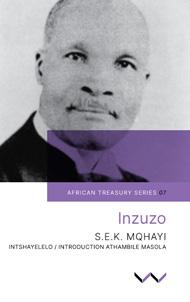
Samuel Edward Krune Mqhayi (1875-1945) is one of the great isiXhosa literary figures. He was a prominent praise poet (imbongi), author, historian and translator. He was also involved in the revision of the isiXhosa Bible translation. Athambile Masola is a lecturer in the Department of Historical Studies at the University of Cape Town.
Inzuzo is a classic poetry collection from 1943 that comprises five sections: Izabelo (Distributions), Izibongo ezingokufa nokuthwasa komnyaka (Poems about death and the beginning of the year), Izibongo ezingabafi bethu (Poems about the dead), Izibongo ngabawele iilwandle (Poems about people who have travelled overseas), and Ingqokelela (Collection). In each section, Mqhayi proves himself a literary writer with the skill to combine the style of a traditional poet with that of modern poetry. This is most evident in the first section, Izabelo, where the poems reflect Western influence in their structure. Mqhayi’s poetry also serves as a rich archive of historical events, as seen in poems like Umnyaka omtsha, 1915 (New Year 1915), Aa! Zweliyazuza! (Hail Great Britain on whom the sun never sets!), and Umfikazi uCharlotte Manyhi Maxeke, a tribute to Charlotte Maxeke. His distinctive voice as a praise poet stands out. The poems present Mqhayi as a religious, social, and people’s poet—deeply committed to the wellbeing of his community and to African culture. Widely known as the father of isiXhosa poetry, Mqhayi was revered as Imbongi yeSizwe Jikelele (National Poet).

Related title: Abantu Besizwe 978-1-86814-501-0
September 2024 | 190 x 120 mm | 152 pp | Paperback | Rights: World Print: 978-1-77614-916-2 | PDF: 978-1-77614-917-9
EPUB: 978-1-77614-918-6
Subjects: Poetry by individual poets Language of Text: isiXhosa
Shaaban Robert
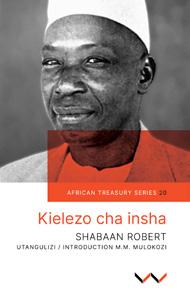
Shaaban Robert was the leading east African writer of the colonial period who became known as ‘The Father of Kiswahili Literature’.
Kielezo cha Insha is the earliest guide to essay writing in Kiswahili, published by Wits University Press in 1954. After Tanzania’s independence in 1961 the book was not available for several decades because of the political and economic sanctions against the apartheid regime in South Africa. The book covers pertinent issues in composition writing, including the purpose and types of composition, preparation, structure, language and style, cohesion, objectivity and punctuation. It includes 60 model essays together with Robert’s thoughts and perspectives on the issues he addresses. The topics include some of the issues current at the time, such as ‘secret marriages’, culture, the environment, language and nationhood, patriotism, women’s oppression, health, and the meaning of life and death. After being out of print for more than sixty years, Wits University Press has reissued the text as a testament to its enduring historical value. Kielezo cha Insha is an example of Robert’s educational and pedagogical writing at its best.

Related title: Pelong ya ka 978-1-77614-043-5
December 2024 | 190 x 120 mm | 144 pp | Paperback | Rights: World Print: 978-1-77614-913-1 | PDF: 978-1-77614-914-8
EPUB: 978-1-77614-915-5
Subjects: Writing & editing guides
Language of Text: Kiswahili
Lyn Wadley & Ghilraen Laue

Lyn Wadley is Honorary Professor of Archaeology in the Evolutionary Studies Institute at the University of the Witwatersrand, Johannesburg. Ghilraen Laue is Curator at the KwaZulu-Natal Museum and Honorary Research Fellow in the Rock Art Research Institute (RARI) at the University of the Witwatersrand, Johannesburg.
Rock Art of the Waterberg: Rites and Transformation is a landmark archaeological study that unveils the nuanced world view and rituals practised by local Bushman groups living in the Waterberg area of the Limpopo Province millennia ago. Through unprecedented documentation of 130 rock art sites – many photographed for the first time –Lyn Wadley and Ghilraen Laue reveal a complex narrative of human creativity and cultural interaction. Exploring the intricate visual languages of Bushman hunter-gatherers, Iron Age farmers and Khoekhoe herders, the book illuminates profound themes of human experience – hunting, initiation, healing and spiritual transformation. Archaeological evidence suggests that these diverse groups coexisted and influenced one another’s cultural practices over two thousand years, challenging simplistic narratives of cultural isolation. Richly illustrated with archival photographs, enhanced views of the rock sites using cutting-edge photographic technology and original artworks by local artists, Rock Art of the Waterberg is a powerful testament to early human creativity and a crucial argument for preserving these fragile cultural archives. This ground-breaking study redefines our understanding of South African rock art and cultural heritage, offering scholars and enthusiasts an unprecedented journey into a forgotten world.
An elegant and compelling contribution, this book masterfully weaves rock art interpretation with archaeological context, ethnographic insight, and material culture analysis. Wadley and Laue transcend traditional boundaries to offer a nuanced, multi-stranded account of Waterberg imagery and its creators. A landmark volume that deepens our understanding of southern African pasts while setting a new standard for interdisciplinary rock art research.
— Francesco d’Errico, CNRS Director of Research, University of Bordeaux, France

Related title: Termites of the Gods 978-1-86814-776-2
November 2025 | 254 x 203 mm | 412 pp | Paperback | Rights: World Print: 978-1-77614-957-5 | PDF: 978-1-77614-959-9
EPUB: 978-1-77614-960-5
Subjects: Archaeology by period & region, Sociology: customs & traditions
Edited by Pravin Manga

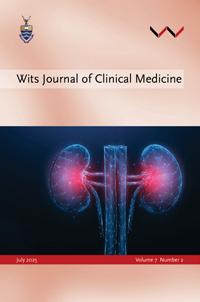
The Wits Journal of Clinical Medicine (WJCM) is a peerreviewed scientific research journal published tri-annually. It is a forum to showcase scientific research from Clinical Medicine Departments at institutions in South Africa and internationally. The journal is also a portal to highlight pressing health issues of our times and will publish opinion pieces or commentaries in this regard. The journal aims to provide an opportunity for emerging researchers to publish their work as Open Access and sets out to be the primary dissemination portal for clinical medical scientists from southern Africa. The editorial policy of the journal is guided by scientific quality, originality and integrity, and all publications are peer reviewed. WJCM especially welcomes submissions from younger academics including registrars, fellows and junior consultants, who are encouraged to submit their research.
The Wits Journal of Clinical Medicine is hosted by ScienceOpen - https://www.scienceopen.com/collection/WITS_WJCM
Three issues per year
ISSN: 2618-0197 (digital)
Subjects: Health & Medical Sciences
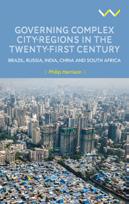
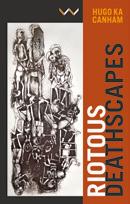

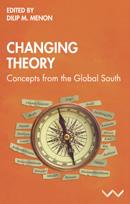
Brazil, Russia, India, China, and South Africa
Philip Harrison
Explores the challenges of large, complex, institutionally fragmented, and dynamic city-regions across the BRICS countries and the emergence of formal and informal governance arrangements.
November 2023 | 234 x 156 mm | 288 pp | Paperback | Rights: World Print: 978-1-77614-852-3 | PDF: 978-1-77614-854-7 | EPUB: 978-1-77614-855-4
Subjects: Urban & municipal planning, Regional government
Hugo Canham
Hugo ka Canham presents an understanding of life and death based on indigenous and black ways of knowing that he terms Mpondo theory.
April 2023 | 229 x 152 mm | 288 pp | Paperback | Rights: SADC + Kenya
Print: 978-1-77614-863-9
Subjects: Social & cultural history, Cultural studies
Edited
by Mbongiseni Buthelezi & Peter Vale
A multidisciplinary analysis of how state capture unfolded in South Africa and how it was contested within both civil society and the state itself.
June 2023 | 234 x 156 mm | 282 pp | Paperback | Rights: World Print: 978-1-77614-831-8 | PDF: 978-1-77614-833-2 | EPUB: 978-1-77614-834-9
Subjects: Political corruption, Public administration
Concepts from the Global South
Edited by Dillip M Menon
A radical decolonial project drawing on concepts from 16 global languages to rethink critical theory, reshaping the humanities and social sciences from the Global South.
July 2022 | 234 x 156 mm | 366 pp | Paperback | Rights: SADC + Kenya
Print: 978-1-77614-793-9
Subjects: Social & political philosophy, Literary theory
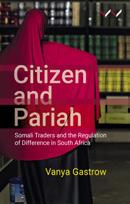



Explores the fragility of law, pluralism and democracy in South Africa by investigating Somali informal shopkeepers’ experiences of crime, justice and regulation in the country.
March 2022 | 229 x 152 mm | 252 pp | Paperback | Rights: World Print: 978-1-77614-739-7 | PDF: 978-1-77614-741-0 | EPUB: 978-1-77614-742-7
Subjects: Migration, immigration & emigration, Citizenship & nationality law
Neoliberal Capitalism and the Rise of Authoritarian Politics
Edited by Michelle Williams & Vishwas Satgar
This book interrogates how capitalism is destroying democracy through the commodification of everything into market democracy, and affirms the need to reclaim and re-build expansive democracy.
August 2021 | 234 x 156 mm | 248 pp | Paperback | Rights: World Print: 978-1-77614-699-4 | PDF: 978-1-77614-701-4 | EPUB: 978-1-77614-702-1
OA PDF: 978-1-77614-704-5
Subjects: Politics & government, Economics
South African and Global Democratic Eco-Socialist Alternatives
Edited by Vishwas Satgar
This volume explores emerging eco-socialist alternatives, presenting insights from leading climate justice activists and movements working to renew socialism through democratic, systemic, and environmental transformation.
February 2018 | 229 x 150 mm | 372 pp | Paperback | Rights: World Print: 978-1-77614-054-1 | PDF: 978-1-77614-207-1 | EPUB: 978-1-77614-330-6
OA PDF: 978-1-77614-704-5
Subjects: Climate change, Political economy
Achille Mbembe
Mbembe argues that Afro-diasporic thought presents the only solution for contemporary capitalism: repairing that which is broken, developing a new planetary consciousness, and reforming a community of humans in solidarity with all living things.
March 2024 | 229 x 152 mm | 200 pp | Paperback | Rights: SADC + Kenya Print: 978-1-77614-923-0
Subjects: Politics & political theory, History


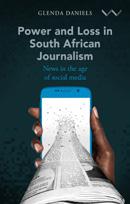

Steven Friedman
Shows how and why the meaning of anti-Jewish racism has been distorted to serve the Israeli state and what this implies for anti-racism today.
Novemebr 2023 | 229 x 156 mm | 230 pp | Rights: World Print: 978-1-77614-848-6 | PDF: 978-1-77614-850-9 | EPUB: 978-1-77614-851-6
Subjects: Politics & government, Social discrimination & inequality
Julie
Reid & Dale T McKinley
Focusing on three South African communities the authors dismiss the idea that some groups are voiceless, arguing that they are being deliberately ignored by dominant news media.
May 2020 | 229 x 152 mm | 234 pp | Paperback | Rights: World Print: 978-1-77614-577-5 | PDF: 978-1-77614-578-2 | EPUB: 978-1-77614-579-9
Subjects: Media studies|, Cultural studies
Glenda Daniels
The essays in this book analyses the crisis and chaos of journalism in contemporary South Africa and argues for and about the power of public interest journalism.
July 2020 | 229 x 152 mm | 232 pp | Paperback | Rights: World Print: 978-1-77614-599-7 | PDF: 978-1-77614-600-0 | EPUB: 978-1-77614-601-7
Subjects: Press & journalism, Politics & government
Constructing and Resisting the Surveillance State in South Africa
Jane Duncan
Jane Duncan explores South Africa’s shift toward a surveillance state and examines how collective action can resist unaccountable surveillance and protect democratic freedoms.
May 2018 | 234 x 156 mm | 312 pp | Paperback | Rights: World Print: 978-1-77614-215-6 | PDF: 978-1-77614-216-3 | EPUB: 978-1-77614-217-0
Subjects: Political control & freedoms, Politics & government
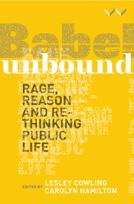


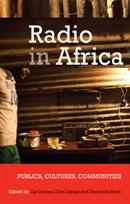
Edited by Lesley Cowling & Carolyn Hamilton
Writers from the Global South explore diverse forms of publicness, offering new concepts and methods rooted in African contexts to analyse public engagement globally.
May 2020 | 234 x 156 mm | 292 pp | Paperback | Rights: World Print: 978-1-77614-589-8 | PDF: 978-1-77614-590-4 | EPUB: 978-1-77614-591-1
Subjects: Political science & theory, Media studies
Edited by Vishwas Satgar
Through a Marxist positioning, this volume critically engages with the class project of digital monopoly capitalism and the implications of its powerful totalitarian enabling tendencies.
May 2025 | 234 x 156 mm | 208 pp | Paperback | Rights: World Print: 978-1-77614-940-7 | PDF: 978-1-77614-942-1 | EPUB: 978-1-77614-943-8
Subjects: Ethical & social aspects of IT, Sociology: work & labour
Edited by Chris Broodryk
This edited book is on neglected public intellectuals in the arts and humanities, and journalism who gave voice and presence to those who have been marginalised and silenced in South African history.
July 2021 | 234 x 156 mm | 246 pp | Paperback | Rights: World Print: 978-1-77614-689-5 | PDF: 978-1-77614-691-8 | EPUB: 978-1-77614-692-5
Subjects: Cultural studies, African history
Publics, Cultures, Communities
Edited by Dina Ligaga, Liz Gunner & Dumisani Moyo
Radio in Africa explores radio’s vital and varied roles across Anglophone, Lusophone, and Francophone Africa, highlighting its deep impact on everyday life and communication.
June 2011 | 235 x 155 mm | 368 pp | Paperback | Rights: World Print: 978-1-86814-550-8 | PDF: 978-1-86814-705-2 | EPUB: 978-1-86814-826-4
Subjects: Cultural studies, Radio

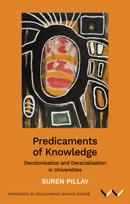


Achille Mbembe
Achille Mbembe examines postcolonial paradoxes, offering powerful insights into African experience while rethinking identity, democracy, and community through liberatory, humanist visions for the future.
February 2021 | 229 x 152 mm | 280 pp | Paperback | Rights: Southern Africa Print: 978-1-77614-323-8 | PDF: 978-1-77614-329-0
Subjects: Philosophy, Political science & theory
Decolonisation and Deracialisation in Universities
Suren Pillay
These essays contribute to the debate about what it means to decolonise, deracialise, and transform knowledge after apartheid by problematising and clarifying the stakes involved.
September 2024 | 229 x 152 mm | 216 pp | Paperback | Rights: World Print: 978-1-77614-905-6 | PDF: 978-1-77614-907-0 | EPUB: 978-1-77614-908-7
Subjects: Higher & further education, tertiary education, Decolonisation of knowledge
Revolution and Evolution
Edited by David Boucher & Ayesha Omar
Offers a comparative analysis of the processes and aftermath of decolonisation from philosophical, historical, literary and legal perspectives.
October 2023 | 229 x 152 mm | 272 pp | Paperback | Rights: World Print: 978-1-77614-844-8 | PDF: 978-1-77614-846-2 | EPUB: 978-1-77614-847-9
Subjects: Interdisciplinary studies, National liberation & independence, post-colonialism
Edited by Melissa Steyn & William Mpofu
African scholars examine the construction of ‘the human’ as it’s been conceived through the power of coloniality, arguing for indigenous knowledge systems and traditional wisdom to be part of the conversation.
March 2021 | 234 x 156 mm | 264 pp | Paperback | Rights: World Print: 978-1-77614-651-2 | PDF: 978-1-77614-652-9 | EPUB: 978-1-77614-653-6
OA PDF: 978-1-77614-678-9
Subjects: Society & culture: Social issues & processes




Edited by Jonathan D Jansen
This volume explores urgent questions around decolonisation in curriculum theory, examining its meaning, colonial legacies, and whether true educational transformation is possible or rhetorical.
August 2019 | 224 x 170 mm | 286 pp | Paperback | Rights: World Print: 978-1-77614-335-1 | PDF: 978-1-77614-336-8 | EPUB: 978-1-77614-337-5
Subjects: Higher & further education, tertiary education, Political science & theory
Edited by Susan Booysen
One year after #FeesMustFall, students and scholars explore activism’s impact on decolonisation, feminism, worker rights, and governance in post-apartheid South African universities and society.
October 2016 | 229 x 152 mm | 300 pp | Paperback | Rights: World Print: 978-1-86814-985-8 | PDF: 978-1-86814-986-5 | EPUB: 978-1-86814-987-2
Subjects: Politics & government, National liberation & independence, post-colonialism
This comprehensive treatment of Archie Mafeje as a prominent African thinker and researcher analyses his overall scholarship in the social sciences, his thinking on land and agrarian issues and his role as a theoretician of liberation and revolutionary theory.
September 2020 | 234 x 156 mm | 294 pp | Paperback | Rights: World Print: 978-1-77614-594-2 | PDF: 978-1-77614-595-9 | EPUB: 978-1-77614-596-6
Subjects: African history, Politics & government
Black X examines the signifier X, a marker of the dehumanisation of the black subject, and argues for Azania as a liberatory project in South Africa.
February 2024 | 203 x 127 mm | 184 pp | Paperback | Rights: World Print: 978-1-77614-868-4 | PDF: 978-1-77614-870-7 | EPUB: 978-1-77614-871-4
Subjects: Social & political philosophy, Political science & theory




The Inner Lives of a Global South City
Edited by Cobus van Staden and Nicky Falkof
Examines Johannesburg as a city of multitudinous and contradictory anxieties, showing how anxiety is an overlooked but vital structuring principle of contemporary life.
October 2020 | 234 x 156 mm | 312 pp | Paperback | Rights: World Print: 978-1-77614-628-4 | PDF: 978-1-77614-629-1 EPUB: 978-1-77614-630-7
Subjects: Social Sciences & Sociology, Migration & Urban studies
Johannesburg after Apartheid
Edited by Philip Harrison, Graeme Gotz, Alison Todes & Chris Wray
This book explores Johannesburg’s evolving urban landscape through detailed analyses of its spaces, neighbourhoods, and the shifting social identities shaping South Africa’s economic powerhouse.
October 2014 | 244 x 170 mm | 656 pp | Paperback | Rights: World Print: 978-1-86814-765-6 | PDF: 978-1-86814-766-3 | EPUB: 978-1-86814-813-4
Subjects: Urban & municipal planning, Urban communities
The Johannesburg Moment
Michael Burawoy & Karl von Holdt
Michael Burawoy imagines dialogues between Bourdieu, Marx, Gramsci, and Fanon, while Karl von Holdt applies Bourdieu’s concepts of violence and race to South Africa.
February 2012 | 220 x 150 mm | 248 pp | Paperback | Rights: World Print: 978-1-86814-540-9 | PDF: 978-1-86814-625-3 | EPUB: 978-1-86814-783-0
Subjects: Philosophy, Marxism & Communism
Perspectives from Yeoville Studio, Johannesburg
Edited by Claire Bénit-Gbaffou, Kirsten Dörmann, Sarah Charlton & Sophie Didier
This collection, based on Yeoville Studio’s work in Johannesburg, blends vivid neighbourhood stories with critical reflections on community-engaged research by interdisciplinary Wits University scholars.
October 2019 | 244 x 170 mm | 432 pp | Hardback | Rights: World Print: 978-1-77614-384-9 | PDF: 978-1-77614-385-6
OA PDF: 978-1-77614-389-4
Subjects: Social Sciences & Sociology, Migration & Urban studies


Hannah J Dawson
Examines young men's livelihoods, identities, and political practices in a Johannesburg informal settlement revealing the dynamics of urban work, citizenship and inequality.
May 2025 | 208 x 152 mm | 234 pp | Paperback | Rights: World Print: 978-1-77614-953-7 | PDF: 978-1-77614-955-1 | EPUB: 978-1-77614-956-8
Subjects: Social & cultural anthropology, ethnography, Cultural studies
Phil Bonner & Noor Nieftagodien
Drawing on extensive research, this book explores the East Rand’s history, revealing both apartheid-induced fragmentation and shared regional features across its racially divided towns.
November 2012 | 245 x 200 mm | 284 pp | Paperback | Rights: World Print: 978-1-86814-543-0 | PDF: 978-1-86814-599-7 | EPUB: 978-1-86814-838-7
Subjects: African history, Social & cultural history


Noor Nieftagodien & Phil Bonner
Drawing on life histories and archival sources, this book vividly portrays Alexandra’s daily struggles and its enduring legacy of political resistance from 1912 to today.
November 2008 | 240 x 170 mm | 528 pp | Paperback | Rights: World Print: 978-1-86814-480-8 | PDF: 978-1-86814-614-7 | EPUB: 978-1-77614-123-4
Subjects: African history, Social & cultural history
An
Noor Nieftagodien & Sally Gaule
Orlando West, Soweto illuminates the genesis of Orlando township and its well-known subsequent history, which is inextricably linked with the lives of prominent South Africans such as Nelson Mandela and Desmond Tutu.
August 2012 | 240 x 210 mm | 178 pp | Paperback | Rights: World Print: 978-1-86814-544-7 | PDF: 978-1-86814-595-9 | EPUB: 978-1-77614-114-2
Subjects: African history, Social & cultural history
Libraries, Bookshops, Book Retailers and Prospective Account Holders order from: Blue Weaver | Tel: 021 701 4477 | orders@blueweaver.co.za
Booksite Africa | Tel: 021 950 5900
Retail and Wholesale orders: Ingram Publishing Service | Tel: 1 800 937 8200, option 3 | ips@ingramcontent.com
Consumer orders: NYU Press: nyupressinfo@nyu.edu | witsuniversitypress.nyupress.org
UK, Europe, Middle East, Africa, Pacific, including Australia and New Zealand Mare Nostrum Group – University Presses 39 East Parade, Harrogate, North Yorkshire, HG1 5LQ, United Kingdom www.mngbookshop.co.uk | Tel: + 44 (0)1423526350
Customer Service: enquiries@mare-nostrum.co.uk
LIBRARY
Digital versions of our publications are available for sale internationally to all academic and institutional libraries through EBSCO, JSTOR, Project Muse, ProQuest and Cambridge Core.
CONSORTIAL SALES
Cambridge Core (exclusive for Southern Africa)
If you are interested in translation rights or co-publishing any of our titles contact the Publisher: Veronica Klipp | veronica.klipp@wits.ac.za
Web of Science Book Citation Index | Knowledge Unlatched | Oapen | ORCiD
To submit proposals visit witspress.co.za/page/publish-with-us/ Send submissions to submissions.witspress@wits.ac.za
www.witspress.co.za
Wits University Press
5th Floor, Es'kia Mphahlele Building
University of the Witwatersrand
Cnr Jorissen Street and Jan Smuts Avenue Braamfontein, Johannesburg, South Africa
www.witspress.co.za




